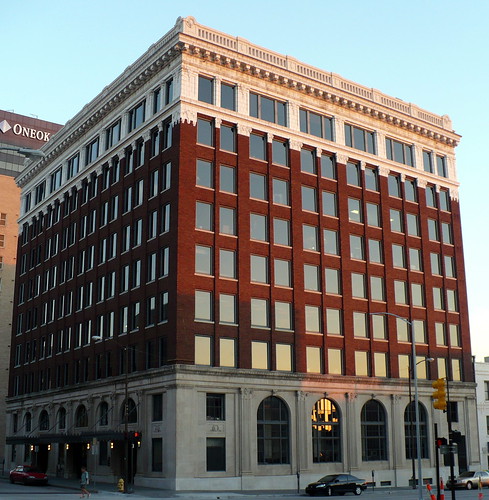Please E-mail suggested additions, comments and/or corrections to Kent@MoreLaw.Com.
Help support the publication of case reports on MoreLaw
Date: 10-16-2018
Case Style:
Holiday Isle Improvement Association, Inc. vs Destin Parcel 160, LLC, a Florida Limited Liability Company
Case Number: 17-5241
Judge: T. Kent Wetherell, II.
Court: FIRST DISTRICT COURT OF APPEAL STATE OF FLORIDA
Plaintiff's Attorney: David A. Theriaque
S. Brent Spain
Defendant's Attorney:
Description:

MoreLaw Suites - Legal Suites and Virtual Offices
The Best Places In Downtown Tulsa To Practice Law
406 South Boulder and 625 South Denver - 582-3993
The Best Places In Downtown Tulsa To Practice Law
406 South Boulder and 625 South Denver - 582-3993
Appellant (the association) sued Appellee (the developer) for declaratory and injunctive relief to compel the developer to submit its building plans to the association for review and approval in accordance with the protective covenants and restrictions on the developer’s property. The trial court granted summary judgment in favor of the developer, and we affirmed that order in Holiday Isle Improvement Association, Inc. v. Destin Parcel 160, LLC, 2018 WL 4139351 (Fla. 1st DCA Aug. 30, 2018). The trial court also awarded prevailing party attorney’s fees and costs to the developer
2
under section 720.305(1), Florida Statutes (2013), and in this appeal, the association challenges that award.
The association argues that there was no legal basis for the award of attorney’s fees and costs to the developer because its suit was filed under chapter 86, Florida Statutes, and neither chapter 86 nor the protective covenants provides for an award of prevailing party attorney’s fees and costs. The developer responds that the absence of authority for an award of attorney’s fees and costs in chapter 86 and the protective covenants is immaterial because the award here was properly based on section 720.305(1). We agree with the developer.
Section 720.305(1) provides in pertinent part:
Each member and . . . and each association, are governed by, and must comply with, this chapter, the governing documents of the community, and the rules of the association. Actions at law or in equity . . . to redress alleged failure or refusal to comply with these provisions may be brought by the association . . . against:
* * *
(b) A member;
* * *
The prevailing party in any such litigation is entitled to recover reasonable attorney fees and costs ....
(emphasis added).1 Even though the declaratory judgment complaint filed by the association did not refer to section 720.305, 1 The statute further provides that in addition to recovering attorney’s fees and costs, “[a] member prevailing in an action between the association and the member under this section . . . may recover additional amounts as determined by the court to be necessary to reimburse the member for his or her share of assessments levied by the association to fund its expenses of the litigation.” However, that provision is not implicated in this case
3
the suit was a de facto action under that section because it sought to redress the developer’s alleged failure or refusal to comply with the protective covenants. Accordingly, under the plain language of section 720.305(1), the developer was entitled to an award of its attorney’s fees and costs as the prevailing party in the suit.
The association also argues that the statute cannot be retroactively applied here because the protective covenants predate the enactment of section 702.305(1) and the statute impairs the parties’ contractual rights under the covenants. We disagree for two reasons.
First, the statute is being applied prospectively—not retroactively—because the association’s cause of action accrued many years after the statute’s effective date. “When attorney’s fees are an item of costs provided by statute, the relevant analysis does not compare the effective date of the statute providing for court costs with the date of the contract, if any, which may be the cause of action in the particular litigation, but compares the effective date of the statute providing for court costs with the date of the accrual of the cause of action in the litigation as to which the court costs, including attorney’s fees, are an adjunct.” Xanadu of Cocoa Beach, Inc. v. Lenz, 504 So. 2d 518, 520 (Fla. 5th DCA 1987).
Second, the statute does not impair the parties’ rights or obligations under the protective covenants because even though the covenants were silent on the issue of attorney’s fees and costs, they provided that “the remedies herein stated shall be construed as cumulative of all other remedies now or hereafter provided by law” (emphasis added). Thus, unlike the case relied on by the association in which the court held that “the statutory imposition of attorneys’ fees where none were bargained for materially changes the binding force of the agreement,” Commodore Plaza at Century 21 Condominium Association, Inc. v. Cohen, 378 So. 2d 307, 309 (Fla. 3d DCA 1980), the imposition of prevailing party because the developer was only awarded its attorney’s fees and costs.
4
attorney’s fees and costs under section 720.305(1) is consistent with—and does not impair—the bargained-for terms of the protective covenants here.
Outcome: For these reasons (and because we find no merit in the other issues raised by the association), we affirm the award of prevailing party attorney’s fees and costs to the developer.
Plaintiff's Experts:
Defendant's Experts:
Comments: